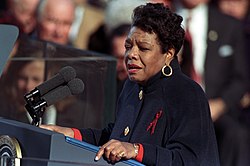
Maya Angelou, an African-American writer who is best known for her seven autobiographies, was also a prolific and successful poet. She has been called "the black woman's poet laureate", and her poems have been called the anthems of African Americans.[1] Angelou studied and began writing poetry at a young age, and used poetry and other great literature to cope with trauma, as she described in her first and most well-known autobiography, I Know Why the Caged Bird Sings. She became a poet after a series of occupations as a young adult, including as a cast member of a European tour of Porgy and Bess, and a performer of calypso music in nightclubs in the 1950s. Many of the songs she wrote during that period later found their way to her later poetry collections. She eventually gave up performing for a writing career.
Despite considering herself a poet and playwright, she wrote Caged Bird in 1969, which brought her international recognition and acclaim. Many of her readers consider her a poet first and an autobiographer second, but she is better known for her prose works. She has published several volumes of poetry, and has experienced similar success as a poet. Early in her writing career, she began alternating a volume of poetry with an autobiography. In 1993, she recited one of her best-known poems, "On the Pulse of Morning", at the inauguration of President Bill Clinton. Angelou explores many of the same themes throughout all her writings, in both her autobiographies and poetry. These themes include love, painful loss, music, discrimination and racism, and struggle. Her poetry cannot easily be placed in categories of themes or techniques. It has been compared with music and musical forms, especially the blues, and like the blues singer, Angelou uses laughter or ridicule instead of tears to cope with minor irritations, sadness, and great suffering. Many of her poems are about love, relationships, or overcoming hardships. The metaphors in her poetry serve as "coding", or litotes, for meanings understood by other Blacks, but her themes and topics apply universally to all races. Angelou uses everyday language, the Black vernacular, Black music and forms, and rhetorical techniques such as shocking language, the occasional use of profanity, and traditionally unacceptable subjects. As she does throughout her autobiographies, Angelou speaks not only for herself, but for her entire gender and race. Her poems continue the themes of mild protest and survival also found in her autobiographies, and inject hope through humor. Tied with Angelou's theme of racism is her treatment of the struggle and hardships experienced by her race.
Many critics consider Angelou's autobiographies more important than her poetry. Although her books have been best-sellers, her poetry has been studied less. Angelou's lack of critical acclaim has been attributed to her popular success and to critics' preferences for poetry as a written form rather than a spoken, performed one.